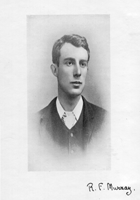Robert Fuller Murray
Robert Fuller Murray Poems
Blue, blue is the sea to-day,
Warmly the light
Sleeps on St. Andrews Bay --
Blue, fringed with white.
...
How often have the critics, trained
To look upon the sky
Through telescopes securely chained,
Forgot the naked eye.
...
My lamp is out, my task is done,
And up the stair with lingering feet
I climb. The staircase clock strikes one.
Good night, my love! good night, my sweet!
...
Never was sun so bright before,
No matin of the lark so sweet,
No grass so green beneath my feet,
Nor with such dewdrops jewelled o'er.
...
When people tell me they have loved
But once in youth,
I wonder, are they always moved
To speak the truth?
...
One dark, dark night--it was long ago,
The air was heavy and still and warm -
It fell to me and a man I know,
To see two girls to their father's farm.
...
The sun shines fair on Tweedside, the river flowing bright,
Your heart is full of pleasure, your eyes are full of light,
Your cheeks are like the morning, your pearls are like the dew,
Or morning and her dew-drops are like your pearls and you.
...
No gift I bring but worship, and the love
Which all must bear to lovely souls and pure,
Those lights, that, when all else is dark, endure;
Stars in the night, to lift our eyes above;
...
If a pleasant lawn there grow
By the showers caressed,
Where in all the seasons blow
Flowers gaily dressed,
...
Till the tread of marching feet
Through the quiet grass-grown street
Of the little town shall come,
Soldier, rest awhile at home.
...
It is the Police Commissioners,
All on a winter's day;
And they to prove the town water
Have set themselves away.
...
Fickle Summer's fled away,
Shall we see her face again?
Hearken to the weeping rain,
Never sunbeam greets the day.
...
Another day let slip! Its hours have run,
Its golden hours, with prodigal excess,
All run to waste. A day of life the less;
Of many wasted days, alas, but one!
...
It seems a little word to say -
FAREWELL--but may it not, when said,
Be like the kiss we give the dead,
Before they pass the doors for aye?
...
So in the village inn the poet dwelt.
His honey-dew was gone; only the pouch,
His cousin's work, her empty labour, left.
But still he sniffed it, still a fragrance clung
...
Early on Christmas Day,
Love, as awake I lay,
And heard the Christmas bells ring sweet and clearly,
My heart stole through the gloom
...
You like the trifling triolet:
Well, here are three or four.
Unless your likings I forget,
You like the trifling triolet.
...
How often have the critics, trained
To look upon the sky
Through telescopes securely chained,
Forgot the naked eye.
...
Robert Fuller Murray Biography
Robert Fuller Murray was born on December 26, 1863, in Roxbury, Massachusetts, to John and Emmeline Murray. In 1869, his parents separated, and John took his young son to Kelso, England, and then to York. Robert was educated at grammar schools first in Ilminster, and later in Crewkerne. Murray attended the University of St. Andrews, where he succeeded in the topic of English moreso than in classical Greek, and received a B.A. in 1881. Due to a lack of other opportunities, Murray became a research assistant to Professor John M. D. Meiklejohn in 1886, and published poetry in several popular journals. He had a brief career in journalism in Edinburgh in mid 1889, and in 1890 returned to St. Andrews. By this time, Murray was dealing with consumption. In 1891, he paid a brief visit to Egypt, and saw publication of The Scarlet Gown. Not long after this, Murray's health continued to deteriorate, bring upon his death in 1894 in St. Andrews. His second volume of poems, Robert F. Murray: his Poems, was published later that year, through his friend Andrew Lang. In 1909, the St. Andrews Students Representative Council published a second edition of The Scarlet Gown.)
The Best Poem Of Robert Fuller Murray
A December Day
Blue, blue is the sea to-day,
Warmly the light
Sleeps on St. Andrews Bay --
Blue, fringed with white.
That's no December sky!
Surely 'tis June
Holds now her state on high,
Queen of the noon.
Only the tree-tops bare
Crowning the hill,
Clear-cut in perfect air,
Warn us that still
Winter, the aged chief,
Mighty in power,
Exiles the tender leaf,
Exiles the flower.
Is there a heart to-day,
A heart that grieves
For flowers that fade away,
For fallen leaves?
Oh, not in leaves or flowers
Endures the charm
That clothes those naked towers
With love-light warm.
O dear St. Andrews Bay,
Winter or Spring
Gives not nor takes away
Memories that cling
All round thy girdling reefs,
That walk thy shore,
Memories of joys and griefs
Ours evermore.
